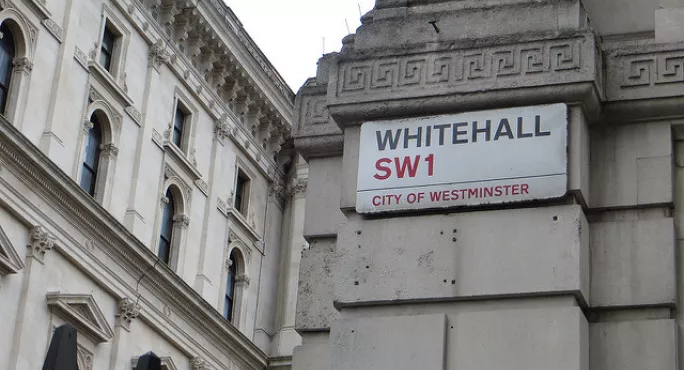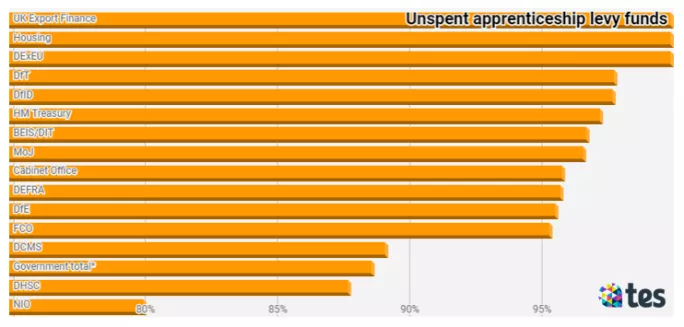
- Home
- Exclusive: £33m of Whitehall apprenticeship levy pot unspent
Exclusive: £33m of Whitehall apprenticeship levy pot unspent

More than two-thirds of Whitehall’s apprenticeship levy pot remains untouched, more than a year after it was introduced - and some departments have not touched a penny of the funding.
The apprenticeship levy was introduced in April 2017 and employers with a wage bill of more than £3 million a year - including government departments - must pay 0.5 per cent of their total payroll bill towards it.
They can then access a digital account through the government’s online apprenticeship portal to view their funds and spend them. Levy funds will expire two years after they enter the account. If they are not used, the employer loses them and they return to the Treasury.
Tes can reveal that, over a year on from the levy being introduced, three departments - the Ministry of Housing, Communities and Local Government; the Department for Exiting the European Union; and UK Export Finance - had yet to spend any of their apprenticeship levy funds.
The Department for Education (DfE) - the government department responsible for the apprenticeship levy - had only spent 4 per cent of its levy pot. Between April 2017 and July 2018, the department paid £1.8 million towards the apprenticeship levy, but at the end of this period had only spent £79,000 on apprenticeships.

As part of a Tes investigation, the results of Freedom of Information requests to every government department reveal that, collectively, Whitehall had only spent 30 per cent of its cumulative levy pot, more than a year on from the levy’s introduction.
The Ministry of Defence (MoD) is the biggest contributor to the levy, representing three-quarters of the total. Between April 2017 and April 2018, the MoD paid £35.2 million towards the levy and spent £12.7 million on apprenticeships - 36 per cent of the total. Across all other government departments, 89 per cent of the levy pot remained unspent.
Government focus on apprenticeships
Across government, more than £33 million remains unspent - enough to take on 6,600 level 3 business administrator apprentices, for example, or 1,500 level 7 digital and technology solution specialist apprentices.
The government has put increasing the number of apprenticeships front and centre of its education and skills agenda.
A public sector apprenticeship target was introduced alongside the levy in April 2017. Public sector bodies with 250 or more staff in England have a target to employ an average of at least 2.3 per cent of their staff as new apprentice starts over the period of 1 April 2017 to 31 March 2021. The Conservative Party also committed to creating 3 million new apprenticeships by 2020 in both its 2015 and 2017 general election manifestos.
‘Needs to be a rocket boost’

Commons Education Select Committee chair and former skills minister Robert Halfon said the government needs to do more.
He added: “Clearly there needs to be a rocket boost led by the DfE in terms of using up their levy funds. It is absolutely vital that the government departments lead by example and give young people the chance to climb up the ladder of opportunity.”
Jamie Kerr, head of external affairs at the Institute of Directors, the body that represents the UK’s business leaders, said “it goes without saying” that government departments should try to lead by example in using their levy funds.
He added: “But it may well be that they are encountering the same problems private employers have faced with the levy system. For instance, the process is often difficult to navigate, and in some areas, appropriate standards are not in place to fulfil firms’ skills needs.
“These figures underline the fact that employers’ issues with the system don’t stem from obstinacy. Businesses support the levy in principle, but urgently want to see reform, so that they can provide more opportunities to help tackle the UK’s skills shortages.”
The government should be ‘open and transparent’
Chief executive of the Learning and Work Institute Stephen Evans said the figures show that the levy system has been slow to get off the ground for government departments, like employers more generally.
He added: “Across the board, we need a greater focus on quality and access. I’d like the government to commit to publishing the breakdown of its apprenticeships as well as pay and job outcomes for apprentices, so we can see it leading the way on open data and transparency.”
Mark Dawe, chief executive of the Association of Employment and Learning Providers said: “It would seem that the DfE will be missing yet another target. Clearly, targets don’t matter to them anymore, but I am sure what they are doing is very high quality.”
Apprenticeships and skills minister Anne Milton said: “I am pleased the DfE met its public sector target in 2017-18, but we want to continue to build on this and create even more fantastic opportunities for people to get a rewarding career in the civil service.
“The apprenticeship levy was brought in to create long-term, sustainable investment in apprenticeship training. Any levy funds that are not spent after 24 months are reinvested into the overall apprenticeships programme.”
What each department has spent
- Cabinet Office: Paid: £979,150; Spent: £40,358 - 4 per cent (Up to April 2018)
- Department for Business, Energy and Industrial Strategy/Department for International Trade: Paid: £968,084; Spent: £31,000 - 3 per cent (Up to April 2018)
- Department for Digital, Culture, Media and Sport: Paid: £221,972; Spent: £24,000 - 11 per cent (Up to August 2018)
- Department for Education: Paid: £1,800,000; Spent: £79,000 - 4 per cent (Up to July 2018)
- Department for Environment, Food and Rural Affairs: Paid: £547,456; Spent: £22,889 - 4 per cent (Up to April 2018)
- Department for Exiting the European Union: Paid: £131,791; Spent: £0 - 0 per cent (Up to August 2018)
- Department for International Development: Paid: £626,451; Spent: £13,913 ؘ- 2 per cent (Up to July 2018)
- Department for Transport: Paid: £2,530,445; Spent: £54,751 - 2 per cent (Up to July 2018)
- Department of Health and Social Care: Paid: £327,407; Spent: £39,998 - 12 per cent (Up to April 2018)
- Foreign and Commonwealth Office: Paid: £748,881; Spent: £34,512 - 5 per cent (Up to August 2018)
- HM Treasury: Paid: £372,574; Spent: £9,989 - 3 per cent (Up to August 2018)
- Ministry of Defence: Paid: £35,200,000; Spent: £12,700,000 - 36 per cent (Up to March 2018)
- Ministry of Housing, Communities and Local Government: Paid: £359,196; Spent: £0 - 0 per cent (Up to April 2018)
- Ministry of Justice: Paid: £2,526,375; Spent: £83,826 - 3 per cent (Up to June 2018)
- Northern Ireland Office: Paid: £27,559; Spent: £5,500 - 20 per cent (Up to August 2018)
- UK Export Finance: Paid: £58,408; Spent: £0 - 0 per cent (Up to April 2018)
- Notes: The Department for Work and Pensions and the Home Office have not yet replied to our FOI requests.
The Offices of the Secretaries of States for Scotland and Wales and the Attorney General’s Office have a pay bill of less than £3 million and so do not pay the apprenticeship levy.
Register with Tes and you can read five free articles every month, plus you'll have access to our range of award-winning newsletters.
Keep reading for just £4.90 per month
You've reached your limit of free articles this month. Subscribe for £4.90 per month for three months and get:
- Unlimited access to all Tes magazine content
- Exclusive subscriber-only stories
- Award-winning email newsletters
You've reached your limit of free articles this month. Subscribe for £4.90 per month for three months and get:
- Unlimited access to all Tes magazine content
- Exclusive subscriber-only stories
- Award-winning email newsletters



